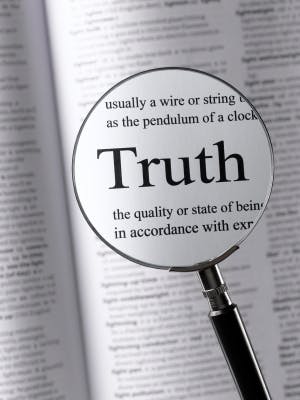There is a discussion on LinkedIn titled As a Leader, do you hear less of the truth from your team?
As I am writing this, there are 105 responses. I have been seeing this on my weekly feed for some time, and each time I see it, it bothers me. Perhaps it’s time to explore why.
Fundamentally I am bothered by a sense that truth is growing more and more elusive.
Disturbing wisdom from a Wizard
We certainly have a few negative role models for truth in leadership these days, if you follow newspapers and business journals. I had high hopes that the escapades of the likes of Enron, Arthur Andersen and others in the early 2000s might be a wake-up call to the world that we live in, that acting illegally has material consequences. Not so much.
In the musical Wicked, Elphaba accuses the Wizard of lying to the people of Oz. He pipes back, “Where I come from, we believe all sorts of things that aren’t true. We call it history.”
Well, that’s disturbing, but probably not too far from the truth.
In today’s world, we call it “spin.”
History, spin — where does truth come in? Perhaps the Wizard offers a hint of why truth has become elusive, and even why leaders hear less of the truth from their teams.:
“There are precious few at ease with moral ambiguities, so we act as though they don’t exist.”
When they don’t want to hear the truth
Simply put, a leader that doesn’t hear the truth from their team doesn’t want to hear the truth.
There can be many reasons. Perhaps the leader doesn’t feel empowered to respond, perhaps the leader has no better intelligence than her team. Perhaps the leader knows that the employee won’t want to hear the answer.
It could be that a leader believes that he or she is hearing the truth from the team. Keeping dialogue at a superficial level allows the leader to “check the box” that they asked for feedback, and that the team responded to, but nothing changes.
I see this all the time when working with clients on dissecting employee feedback surveys. Leaders complete the basic task – report the results back to the team and ask for feedback – but the team either knows or suspects that the leader really doesn’t want to hear it.
Employees are smart people. They see through lies, half-truths, avoidance and “spun” information.
How leaders can be truthful — and generate it, too
They read the clues – hesitation, procrastination, and they try to reconcile when what they hear doesn’t match what they see happening. In the reconciliation process, they devise their hypothesis about what’s going on, and generally it is not favorable to the leader or organization.
How can leaders, who are also smart people, be truthful with and generate truth from their team?
- They can make a commitment to transparency. By saying what the leader knows and doesn’t know and by saying why information can be divulged or not, the leader’s words should mirror the actions, relieving the team of having to come up with their own hypothesis. Transparency fosters trust, but it doesn’t happen overnight.
- They can be very observant. Leaders who spend time with their team, who ask good and insightful questions, can also hear what the team says and doesn’t say. Remembering that at least 80 percent of communication occurs without saying a word, leaders can glean important information about how messages are being received.
- They can push beyond the superficial questions. Asking a team what they need may or may not provide insight. Asking a team if they have the right staffing and equipment to produce the expected performance will yield more specific answers, and yet more if the dialogue continues. Asking questions to which the team knows you may not be able to respond positively demonstrates a willingness to take on hard topics.
- They can rise above the fear of what to say or not say. Lack of confidence is a clue to the team that the leader is unsure, but confidence and truth together are a powerful mixture. If a leader is unsure, seek out a mentor and practice until you know the message is truthful, and you can deliver it with confidence.
- They can follow-up. Asking good questions and getting sincere feedback requires action, or the leader’s transparency is kaput. Even if the answer is “no,” it is an opportunity to provide the why and to continue the dialogue about options or alternatives.
- They can prove their trustworthiness by a track record of honest and open communication. Trust can evaporate quickly when it is broken. A consistent and honest dialogue opens up ideas and innovation, and paves the way toward higher performance of the team.
I started this post to explore why it bothers me that someone would ask about (or worse, admit to lack of) truth in a leadership/team relationship. Leadership is hard work, as is building trust.
But that’s what leadership is all about. Otherwise, why do you need the leader?
That’s my thought, anyway. I would love to hear yours.
This originally appeared on the ….@ the intersection of learning & performance blog.
